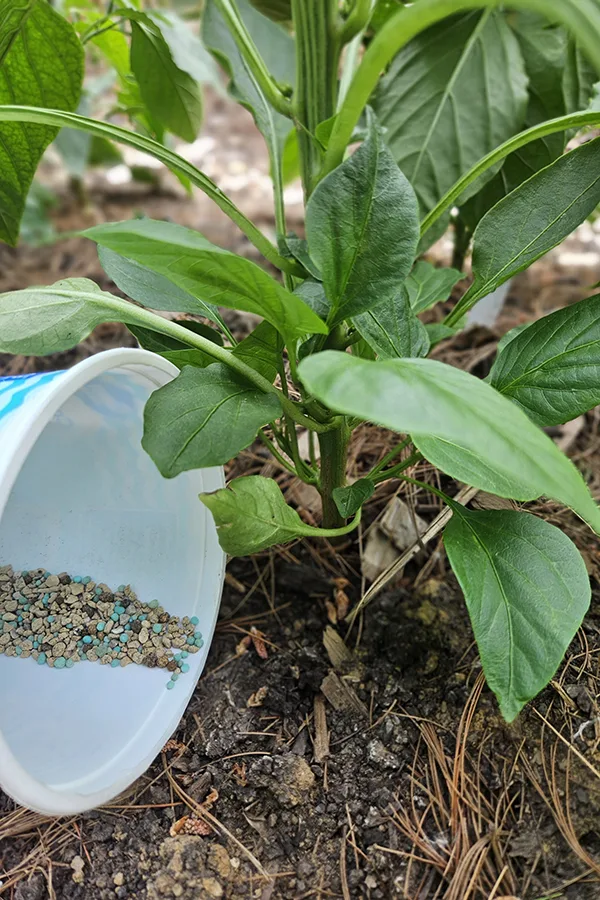Uncover the Best Fertilizers for Peppers: Essential Nutrients for Prospering Plants
Uncover the Best Fertilizers for Peppers: Essential Nutrients for Prospering Plants
Blog Article
Organic Vs. Synthetic Fertilizers: Which Is Best for Supporting Healthy Pepper Plants?
In the world of supporting healthy and balanced pepper plants, the option in between artificial and organic fertilizers stands as an essential choice with far-reaching implications. While both options aim to give necessary nutrients to sustain plant growth, the subtleties of their effect on the soil, plant health, and the atmosphere trigger a dispute that mirrors throughout the gardening neighborhood. Understanding the distinct advantages and possible pitfalls of each fertilizer kind is vital for pepper cultivators looking for to enhance their yields while preserving a lasting and eco-conscious approach.
Advantages of Organic Fertilizers
Organic fertilizers supply an environmentally-friendly and lasting method to beneficial pepper plants, giving vital nutrients without the use of synthetic chemicals. These natural fertilizers are acquired from organic sources such as garden compost, manure, bone meal, and algae, promoting soil wellness and biodiversity. Unlike synthetic plant foods, organic choices launch nutrients gradually, making certain a balanced and steady supply for pepper plants to flourish.
One substantial benefit of organic fertilizers is their capacity to boost dirt framework and water retention. By boosting soil health and wellness, natural fertilizers promote beneficial microbial activity, which aids in nutrient uptake by pepper plants. Additionally, natural plant foods decrease the risk of chemical run-off, securing water sources from contamination and protecting the setting.
In addition, natural plant foods add to long-term soil fertility by promoting the growth of valuable soil organisms. These microorganisms aid damage down raw material, launching nutrients in a form that is conveniently accessible to pepper plants. best fertilizers for peppers. By cultivating a healthy soil ecological community, organic fertilizers support sustainable pepper growing techniques that benefit both plants and the setting
Disadvantages of Synthetic Plant Foods
Synthetic plant foods, in contrast to their organic equivalents, present different negative aspects when used to nourish pepper plants, impacting both plant wellness and environmental sustainability. One significant disadvantage of artificial fertilizers is their tendency to seep nutrients from the soil rapidly.
Furthermore, the overuse of synthetic fertilizers can add to water air pollution. Excess plant foods not soaked up by plants can get rid of into water bodies, causing eutrophication, where algae blossoms deplete oxygen levels in the water, hurting aquatic life. In addition, synthetic fertilizers are commonly originated from non-renewable resources, such as nonrenewable fuel sources, contributing to carbon emissions and ecological destruction during their manufacturing.
Nutrient Absorption Comparison
Efficient nutrient absorption plays an important duty in the overall health and development of pepper plants. When contrasting organic and artificial plant foods in regards to nutrient absorption, organic plant foods have the advantage of offering a much more well balanced and slow-release source of nutrients (best fertilizers for peppers). Organic plant foods consist of a variety of macro and trace elements that are not only beneficial for the plants but likewise promote healthy and balanced dirt microbial activity, which aids in nutrient uptake. On the other hand, synthetic fertilizers often offer a fast launch of nutrients, which can cause leaching and runoff, resulting in lower nutrient absorption prices by the plants.
In addition, organic plant foods improve dirt structure and water retention capacity, enabling pepper plants to gain access to nutrients a lot more efficiently. This improved soil quality facilitates origin advancement, enabling better nutrient absorption. Synthetic fertilizers, although at first increasing plant development because of their high nutrient focus, may impede lasting nutrient absorption by derogatory soil health gradually.
Ecological Influence Considerations

On the other hand, artificial fertilizers, although often even more right away offered and concentrated to plants, advice can have harmful effects on the setting if not applied properly (best fertilizers for peppers). Their production needs high power inputs, bring about greenhouse gas discharges and adding to environment change. Additionally, the runoff of excess artificial plant foods can pollute water sources, leading to eutrophication and damaging water communities.
Best Fertilizer Practices for Peppers
When fertilizing pepper plants, maximizing nutrient uptake and reducing ecological impact are essential factors to consider. To achieve this, it is important to adhere to finest fertilizer methods tailored to the certain requirements of pepper plants. One important technique is to carry out a dirt examination prior to applying any type of fertilizers. This examination can figure out the pH degree of the soil and determine any nutrient shortages, assisting you in selecting one of the most ideal plant food formula.
Another important practice is to fertilize pepper plants at the ideal time. Normally, peppers take advantage of obtaining plant food at growing and after that again when they begin to blossom. Over-fertilizing can lead to nutrition imbalances and damage the plants, so it is crucial to adhere to recommended application prices.
In addition, selecting a well balanced fertilizer with an NPK proportion that suits pepper plants' needs is basic. Organic fertilizers, such as garden compost or manure, can be exceptional choices as they launch nutrients slowly and enhance dirt structure with time. Nonetheless, artificial fertilizers can supply a fast nutrient increase when required. Ultimately, incorporating synthetic and organic fertilizers judiciously can assist nurture healthy pepper plants while decreasing environmental effect.
Conclusion

Organic plant foods provide an environmentally-friendly and lasting technique to nourishing pepper plants, giving vital nutrients without the use of artificial chemicals. Unlike artificial fertilizers, organic options additional resources launch nutrients gradually, making certain a consistent and balanced supply for pepper plants to prosper.
Synthetic plant foods, in comparison to their natural counterparts, position read here various downsides when made use of to nurture pepper plants, affecting both plant wellness and ecological sustainability. When comparing organic and synthetic fertilizers in terms of nutrient absorption, organic fertilizers have the advantage of giving a much more well balanced and slow-release source of nutrients.Additionally, natural fertilizers improve soil framework and water retention capacity, enabling pepper plants to accessibility nutrients much more successfully.
Report this page